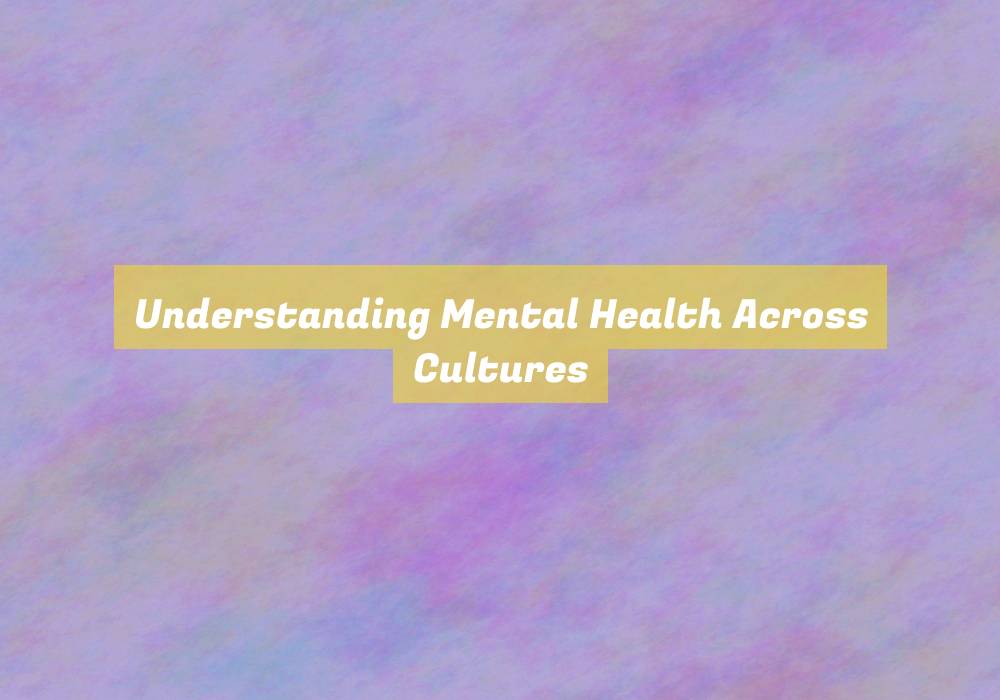Understanding Mental Health Across Cultures
When it comes to mental health, itG??s often said that itG??s like an iceberg G?? what you see on the surface is just a fraction of what lies beneath.
But have you ever considered how this iceberg might look different across various cultures? The cultural nuances that shape perceptions, stigmas, and expressions of mental health can be both fascinating and complex.
Exploring these differences not only broadens your understanding of human experiences but also sheds light on the diverse ways in which mental health is approached and addressed.
Cultural Perceptions of Mental Health
Understanding how different cultures perceive mental health is crucial for providing effective and culturally sensitive support to individuals struggling with mental health issues.
In some cultures, mental health is deeply intertwined with spiritual beliefs, and seeking help from traditional healers or religious leaders is often the preferred approach. This can influence how individuals in these cultures perceive mental health issues and may impact their willingness to seek professional help.
On the other hand, in Western cultures, thereG??s a growing emphasis on destigmatizing mental health challenges and promoting open discussions about psychological well-being. This cultural shift has led to increased acceptance of therapy and psychiatric medication as viable treatment options.
Additionally, certain cultures may view mental health struggles as a sign of personal weakness, leading to feelings of shame and reluctance to disclose such issues.
Understanding these diverse cultural perspectives enables mental health professionals to tailor their approaches to each individualG??s unique cultural background, fostering trust and facilitating more effective support and treatment.
Stigma and Taboos Surrounding Mental Health
Stigma and taboos surrounding mental health persist in many cultures, creating barriers to seeking and receiving appropriate support. In some cultures, mental illness is stigmatized, seen as a personal failure, or attributed to supernatural causes. This can lead individuals to feel ashamed and reluctant to seek help. Moreover, cultural taboos may prevent open discussions about mental health, making it difficult for individuals to express their struggles and seek understanding from their communities. As a result, many people may suffer in silence, without access to the necessary support and treatment.
Furthermore, these stigmas and taboos can also affect the way mental health professionals are perceived within certain cultures. Seeking professional help for mental health issues may be viewed as a sign of weakness, leading to individuals being hesitant to reach out to therapists or counselors. This can perpetuate the cycle of silence and stigma surrounding mental health.
It is crucial to recognize and address these cultural barriers to mental health support. By challenging stigmas and taboos, promoting open conversations, and increasing awareness, individuals can be encouraged to seek the help they need without fear of judgment or discrimination. This cultural shift can make a significant difference in destigmatizing mental health issues and promoting overall well-being.
Cultural Expressions of Mental Health
The cultural stigmas and taboos surrounding mental health can influence how individuals express and address their mental well-being within their specific cultural contexts.
In some cultures, mental health may be expressed through communal rituals or spiritual practices, where the communityG??s support is integral to the individualG??s recovery. For instance, in certain African and Caribbean cultures, mental health may be perceived through a lens of spirituality, and healing ceremonies involving music, dance, and prayer may be central to addressing mental well-being.
In contrast, in some East Asian cultures, mental health expression can be deeply rooted in concepts such as G??saving faceG?? and G??family honorG??, leading individuals to prioritize maintaining a positive public image and avoiding shame, which may impact their willingness to seek help for mental health concerns.
Additionally, cultural expressions of mental health can also be evident in artistic forms such as storytelling, traditional art, and performance, which serve as avenues for individuals to communicate and process their mental health experiences within their cultural frameworks.
Understanding these diverse cultural expressions is crucial in providing effective and culturally sensitive mental health support.
Treatment Disparities and Cultural Competence
Addressing treatment disparities and ensuring cultural competence are essential in providing equitable mental health support across diverse communities. ItG??s crucial to recognize that different cultural groups may have unique beliefs, attitudes, and values regarding mental health, which can influence their willingness to seek help and their expectations of treatment. Disparities in access to mental health services, as well as disparities in the quality of care received, can exist across cultural groups. Without cultural competence, mental health professionals may inadvertently perpetuate these disparities by not fully understanding or addressing the specific needs of individuals from diverse backgrounds.
Cultural competence in mental health care involves being aware of and responsive to the cultural and linguistic needs of clients. It requires understanding how culture impacts an individualG??s perception of mental illness and their approach to treatment. This includes recognizing cultural nuances in communication, family dynamics, and help-seeking behaviors.
Conclusion
Understanding mental health across different cultures is crucial for providing effective and sensitive care. By acknowledging cultural perceptions, addressing stigma and taboos, and recognizing cultural expressions of mental health, we can work towards closing treatment disparities and promoting cultural competence.
ItG??s important to remember that mental health is a universal concern, and by embracing cultural diversity, we can better support individuals from all backgrounds.
